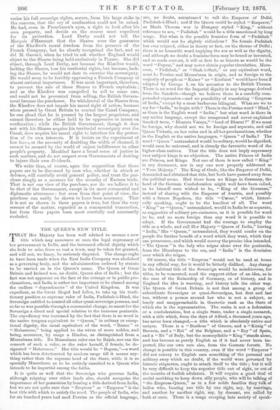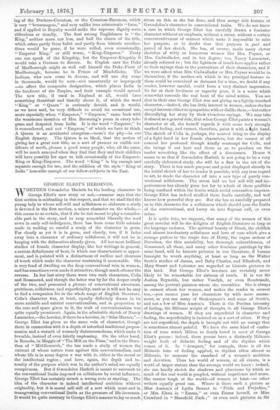THE QUEEN'S NEW TITLE.
THAT Her Majesty has been well advised to assume a new title which may announce at once the legal supremacy of her government in India, and the increased official dignity which she feels to arise from so vast a trust, may be taken for granted, and will not, we fancy, be seriously disputed. The change ought to have been made when the East India Company was abolished as a governing body, and the administration ordered by statute to be carried on in the Queen's name. The Queen of Great Britain and Ireland was, no doubt, Queen also of India ; but the fact was not apparent on the face of the coinage or in public pro- clamations, and India is rather too important to be classed among the endless " dependencies " of the United Kingdom. It was expedient, as the Great Mogul had fallen, to take up his tradi- tionary position as supreme ruler of India, Padishah-i-Hind, the Sovereign entitled to control all other, quasi-sovereign persons, and so far as was possible through a ceremonial change, to assert for the Sovereign a direct and special relation to the immense peninsula. The expediency was increased by the fact that there is no word in the native tongues equivalent to " Queen," in solitary or excep- tional dignity, the usual equivalent of the word, "Ranee" or " Maharanee," being applied to the wives of mere nobles, and being, moreover, by usage a Hindoo, as distinguished from a Mussulman title. No Mussulman ruler can be Rajah, nor can the consort of such a ruler, or the ruler herself, if female, be de- signated " Maharanee." Her title would be " Begum,"—a word which has been deteriorated by modern usage till it means any- thing rather than the supreme head of the State, while it is so specially Mussulmau as to be entirely unsuited to a Queen who intends to be impartial among the faiths.
It is quite as well that the Sovereign who governs India, although reigning over other lands also, should recognise the importance of her possession by bearing a title derived from India, but we are not quite sure that "Empress" or "Emperor" is the best title with which to satisfy the need. The people of India, who for six hundred years had used Persian as the official language, are, no doubt, accustomed to call the Emperor of Delhi, Padishah-i-Hind ; and if the Queen could be styled " Emperor," as Maria Theresa was in Hungary styled "King," without reference to sex, " Padishah " would be a title sanctioned by long usage. But what is the possible feminine form of " Padishah" which would not be slightly ridiculous ? No female Padishah has ever reigned, either in theory or fact, on the throne of Delhi ; there is no honorific word implying the sex as well as the dignity, and although no doubt a feminine form may be found or invented, and so made current, it will at first be as bizarre as would be the word "Popess," and may never obtain popular circulation. More- over, " Padishah," or " Shah-i-Shah," or any equivalent word, must be Persian and Mussulman in origin, and as foreign to the majority of people as " Kaiser" or " Kurfiirst " would have been if adopted by George 1. on his accession to the British Throne. There is no word for the Imperial dignity in any language derived from the Sanskrit—though we believe there is a carefully com- pounded expression—and no possibility of translating "Empress of India," except by a most barbarous bilingual. What are we to say for "India," to begin with ? There is the Persian word " Hind," as there is the English word " India;" but what word is: there in any native language, except the compound and nevermxplained Sanskrit term, " Bharata Varsya," "land of Bharut?" If we must be foreign, why should not we be foreign and separate, and call Queen Victoria, on her coins and in all her proclamations, whether in the English or the native languages, " Queen " of India? The word " Queen " untranslated would be solitary, would be dignified, would soon be universal, and is already the favourite word of the higher-class natives. That the title does not imply supremacy over subject kings is no objection. The native Princes of India are Princes, not Kings. Not one of them is now called " King" in any document, nor is any one now properly addressed as "Your Majesty." The King of Oude, like the Emperor of Delhi, demanded and obtained that title, but both have passed away from the political scene. Had there been no Kings- in Germany, the head of the German Confederation might well have been called, as he himself once wished to be, "King of the Germans," instead of sharing with the Emperor of Austria, and possibly with a future Napoleon, the title " Caesar," which, histori- cally speaking, ought to be the loneliest of all. The word " King " or " Queen," untranslated, would in India be as separate, as suggestive of solitary pre-eminence, as it is possible for word to be, and no more foreign than any word it is possible to adopt. If the Government had the courage to employ the title as a whole, and call Her Majesty " Queen of India," leaving "India," like " Queen," untranslated, they would confer on the people the further benefit of a word which they want, which they can pronounce, and which would convey the precise idea intended. " The Queen " is the lady who reigns alone over, the peninsula, from the Himalayas to the sea, and " India " is the dominion over which she reigns.
Of course, the title " Empress" would, not be used at home in any official way, for it would be bitterly disliked. Any change in the habitual title of the Sovereign would be mischievous, for titles, to be venerated, need the support either of an idea, as in the case of the Kaisership of Germany, or of history, and in England the idea is wanting, and history tells the other way. The Queen of Great Britain is not first among a group of subordinate Sovereigns or quasi-Sovereigns, but first and last too, without a person around her who is not a subject, as lonely and unapproachable in theoretic rank as the State of which she is the representative. The realm is not a federation or a confederation, but a single State, under a single monarch, with a title which, from the days of• Alfred, a thousand years ago, has never been changed,—a title which is absolutely native and unique. There is a " Basileus " of Greece, and a " Konig " of Bavaria, and a " Roi" of the Belgians, and a " Rey " of Spain, and a " Re " of Italy, but the monosyllable " King " stands alone, and has become as purely English as if it had never been im- ported, like our own race also, from the German forests. No change is possible in this country, even if the word " Emperor" did not convey to English ears something of the personal and military sway which no doubt, if the world were governed by historic etiquettes, ought to attach itself to the title ; but it will be very difficult to keep the superior title out of sight, or out of the mouths of foolish adulators. It will require a good deal of social snubbing to keep down silly people, who will be talking of " the Empress-Queen," as in a few noble families they talk of ladies who, bearing one title by one right, say, by marriage, and another by another right, say, by descent, are called by both at once. There is a usage creeping into society of speak- ing of the. Duchess-Countess, or the Countess-Baroness, which is very " brnmmagem," and very unlike true aristocratic "form," and if applied to Royalty would make the supreme dignity seem ridiculous or tinselly. The first among Englishmen is " the King," neither more nor less, and half the charm of the title, which arises partly from habit and partly from historic recollec- tions would be gone, if he were called, even occasionally, " Emperor King," or still worse, " King-Emperor." Every one can speak of the Kingship, but the Emperor-Kingship it would take a German to discuss. In English ears the Duke of Marlborough might as well call himself the Duke-Fiirst of Marlborough, because he is Prince of Mindelheim. The Indians, who now come in dozens, and will one day come in thousands, would be sure—not unnaturally or improperly —to affect the composite designation, which places India in the forefront of the Empire, and their example would spread. The new title, if used in England at all, would have something theatrical and tinselly about it, of which the word ""King" or " Queen" is curiously devoid, and it would, as we have said, be very difficult to avoid its occasional use, more especially when "Emperor," "Emperor," came back with the wearisome iteration of Mrs. Browning's poem in every tele- gram and despatch from India. It is the word " Emperor," be it remembered, and not "Empress," of which we have to think. A Queen is an accidental exception—more's the pity—in our English dynasty. The Queen is so liked, that the notion of giving her a great new title, as a sort of present or visible cer- tificate of merit, pleases a good many people, who, all the same, will be much annoyed when they find that they and their children will have possibly for ages to talk occasionally of the Emperor- King or King-Emperor. The word " King" is big enough and separate enough for use, and the addition of the style " King of India" honorific enough of our fellow-subjects in the East.



































 Previous page
Previous page